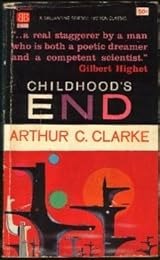 They came completely unexpected. Hundreds of silver spaceships, hovering above all the capitols and major population centers of the Earth. For nearly a week, as thousands rioted in the streets below, they sat there, waiting. And then came the voice of Karellen, chief of the overlords, viceroy of Earth, heralding a new, planet-wide administration that was destined to end war, poverty, hunger, disease, ignorance, and fear. But as the generations pass and a new breed of humanity arises–one that has known no suffering, no danger, no religion but science, and no creative drive beyond sheer curiosity–mankind is about to discover that their welfare is not the overlords’ primary goal. Humanity’s time in the universe is about to come to an end–and a new, alien beginning.
They came completely unexpected. Hundreds of silver spaceships, hovering above all the capitols and major population centers of the Earth. For nearly a week, as thousands rioted in the streets below, they sat there, waiting. And then came the voice of Karellen, chief of the overlords, viceroy of Earth, heralding a new, planet-wide administration that was destined to end war, poverty, hunger, disease, ignorance, and fear. But as the generations pass and a new breed of humanity arises–one that has known no suffering, no danger, no religion but science, and no creative drive beyond sheer curiosity–mankind is about to discover that their welfare is not the overlords’ primary goal. Humanity’s time in the universe is about to come to an end–and a new, alien beginning.
I read this book in three days, but if I didn’t have any distractions or obligations, I could probably have read it in less than half a day. It’s very short–Clarke doesn’t take time to develop characters, describe the setting, give long info dumps, or show off his prosaic skills. He doesn’t even get into detailed explanations of how everything that happens happens. He waves his hand and gives us the broadest possible sweep of human civilization as mankind finally transcends human existence.
Partially because of the broad brush which Clarke uses to paint his picture, I found myself second guessing him at several turns. I was very skeptical of Clarke’s premises and conclusions, and found it very difficult to believe this story at several points. Believability of the aliens was not nearly so much an issue for me as was believability of humanity.
For example, when the overlords bring out a device that allows people to view any scene from any moment in the past, the world’s religious traditions are exposed and within a generation nobody in the world is religious. That’s not how religious experience works, though. Even if all of the religions in the world were hoaxes–which I’m perfectly willing to allow for the sake of a story–many, if not most of the adherents would continue to hold onto their beliefs, if only for no other reason than to hold onto something. There would be a lot more chaos and upheaval, and religion would stay with us in one form or another, if for no other reason than we as humans are religious creatures. It’s in our nature, whether or not any of the world’s religions are true. Clarke seems to demonstrate an ignorance of this as he paints the future with his broad brush.
A lot of other elements were missing in this book, such as character development, development of the setting, a strong buildup of tension, etc etc. However, as hard, classic sci fi, Childhood’s End doesn’t necessarily need those things to be an accomplished work within its genre. Hard sci fi–especially 50s and 60s sci fi–is all about grand, transcendent concepts, and here Childhood’s End succeeds, especially towards the end. When I finished the story and found out humanity’s final destiny, I was left with a sense of overwhelming awe at the grand cosmic scope of the story’s final message, much as I was with 2001: A Space Odyssey. You really feel, by the end, that you’re staring the incomprehensibly infinite right in the face. Good, hard sci fi will do that to you, and it’s wonderful.
I think this story did what Clarke set out for it to do, despite some of the conceptual spottiness that irked me in the beginning and the middle. The ending was solid, and did an excellent job showing what it means to transcend humanity. If you’re looking for a good story, this book probably will frustrate you, but if you’re interested in dreaming about man’s destiny among the stars, this book will give you that sense of awe and wonder that only classic science fiction can.